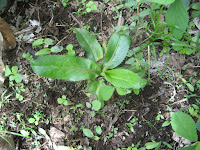Very different plants: the former is leggy, with triple erose
leaves, slow to sprout, and self-seeding for the next season, at least in my
Pennsylvania herb garden; the latter grows wild in Nicaragua, close to the
ground, with round-tipped spear leaves, edged with spiky points. It is also
cultivated at a larger size, and sold in the super. Here is an internet photo of cilantro:
And these are culantro plants in my yard.
Cilantro and culantro have
the same flavor, fragrant and distinctive. Some people hate it, and say it
tastes like soap. I learned to love it in Peruvian cuisine, and it is widely
used here in Nica. It provides a central flavor of ceviche, that tangy mix of
lime juice, onion, chilies, ginger and raw fish. It adds aromatic savor to tomato
and chicken soups, pico de gallo, and is fabulous with jalapeño in hummus.
Riding back from Managua yesterday, the winding route into
the hills on the Pan-American Highway nearly brought my usual nightmare to
life. Cars and trucks, as well as the buses and vans in which I ride, pass
slower vehicles with alarming unconcern for the blind turn ahead. The “almost
accident” involved a military vehicle passing my bus, and an oncoming driver
who slammed on his brakes and did a one-eighty into the curb of the opposite
lane. I believe there was considerable damage to the rear end of the car, and
the driver, though shaken, was uninjured. The military vehicle sat in its
passing posture for about fifteen minutes, while traffic in both directions
maneuvered around it. We pulled off the road; our van driver and half the
passengers walked back to see what was what, and then when we finally resumed
our trip, the conversation centered on the hellacious disregard of drivers who
pass so dangerously. Our driver was stonefaced, and guilty as sin.
When the porter passed through the van collecting fares, the
older lady beside me with a big plastic covered box on her lap paid him in
change. Lots of change. Apparently, she is a vendor of slices of cake, individually
wrapped, and she added a slice to her handful of cordoba coins. People chuckled
at this little propino (tip) for the
porter, but there was method in her largesse. Several passengers then asked to
buy her cakes, and she did pretty good business on her way home.
Usually, I am the only gringa on the bus. Many of the
porters in the Jinotepe-Managua-bound runs know me by now, if only for that
reason. It’s funny, how some riders will smile at me and say “Hi,” or “How are
you?” because they correctly assume my native language. But that’s all the
English they have. It’s like when North Americans who speak no Spanish say “Adios!”
to a Latino. My gring-osity hurts when I am dickering with a cabbie; when I’m
with Noel, the fares are half what I am charged, and sometimes fruit vendors
charge me higher prices as well. I am far too classy to complain, unless it is
blatant profiteering. When I ask the fare to my house from Diriamba, a van porter
may say 30 cordobas, which is the full fare to Managua, and he gets a smirk
from me. 10 or 15 is what I normally pay.



No comments:
Post a Comment